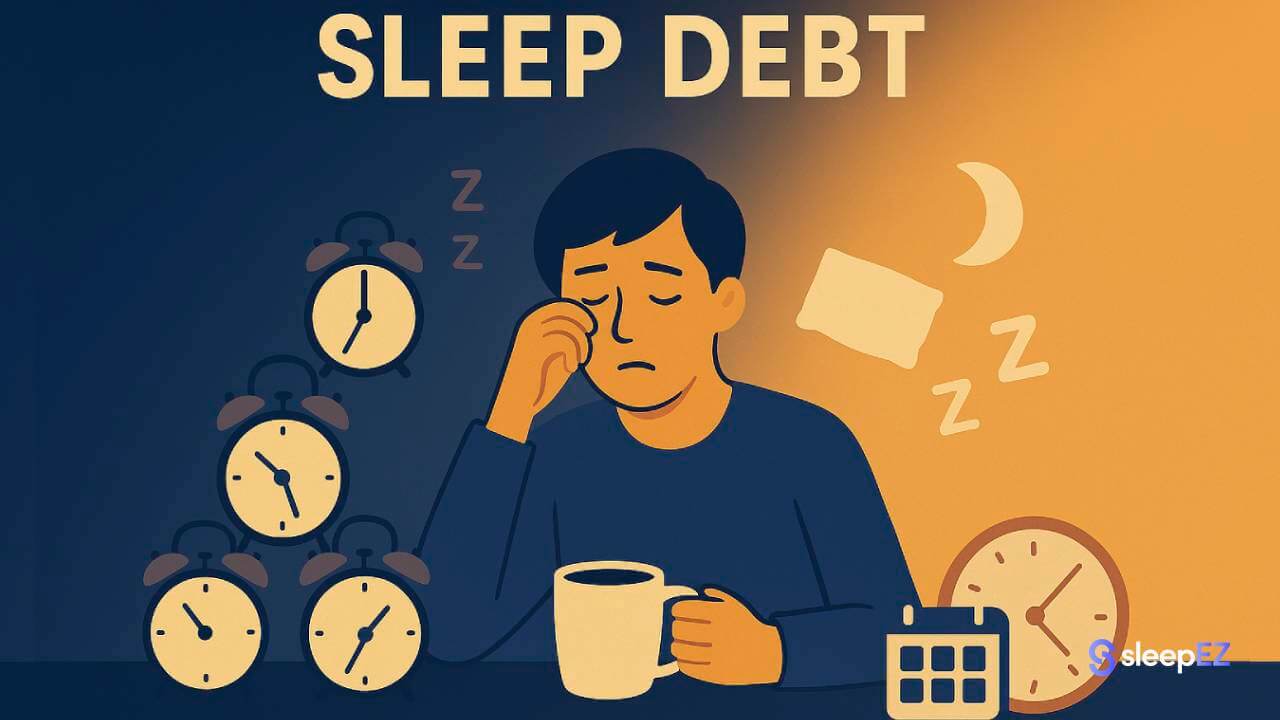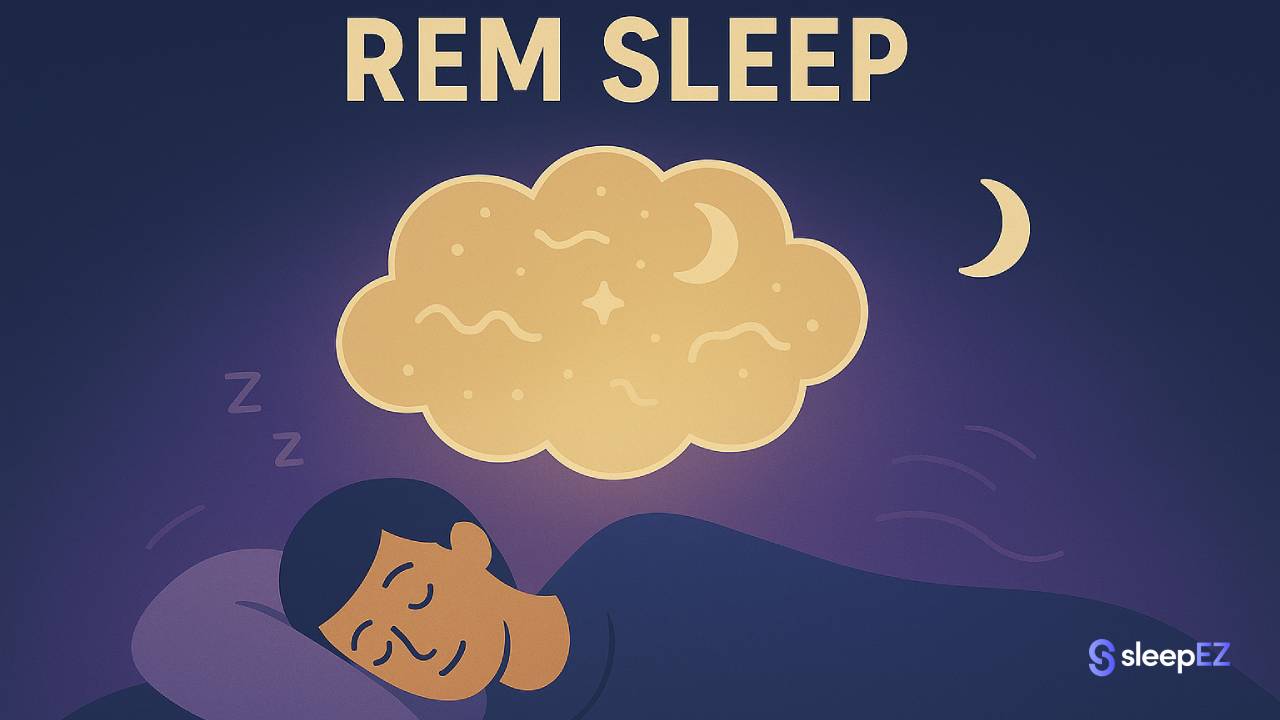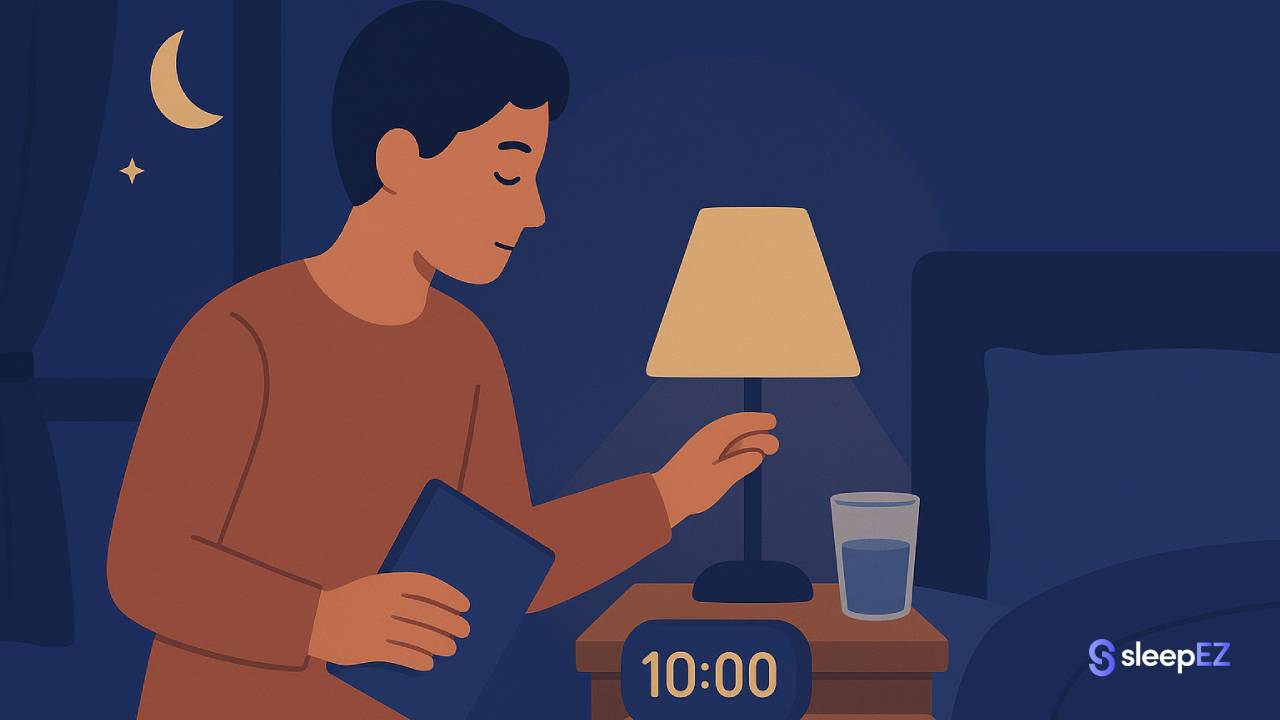Key Takeaways
What it is: Sleep debt is the cumulative difference between the sleep you need and the sleep you get.
The Effects: It impairs cognitive function, mood, and immune response.
Can it be fixed? Yes, but not in one weekend. Recovery requires a consistent, multi-day strategy.
The Best Solution: A consistent sleep schedule is the most effective way to both pay off and prevent sleep debt.
What Is Sleep Debt?
Sleep debt is the accumulated hours of sleep you've missed over time. If your body needs 8 hours of sleep but you only get 6, you've created a 2-hour deficit. Do this for a week, and you're carrying 14 hours of sleep debt.
How to Calculate Your Sleep Debt (A Simple "Pen-and-Paper" Method)
You don't need a fancy gadget to figure out your sleep debt. All you need is a pen and paper. Here's how to do it:
Step 1: Find Your Personal Sleep Need
Most adults need 7-9 hours of sleep per night. To find your number, think about how much sleep you get when you feel your best. If you consistently feel rested after 8 hours, that's your baseline.
Step 2: Track Your Actual Sleep for One Week
For seven days, write down what time you go to bed and what time you wake up. Calculate the total hours for each night. Be honest. Count only actual sleep time, not time spent scrolling on your phone.
Step 3: Do the Math
Use this simple formula:
(Hours Needed Per Night × 7) - (Total Hours Slept This Week) = Your Weekly Sleep Debt
Example: You need 8 hours per night.
- Hours needed: 8 × 7 = 56 hours
- Hours you actually slept: 42 hours
- Your sleep debt: 56 - 42 = 14 hours
That 14-hour deficit is weighing on your body right now.
What Are the Effects of Sleep Debt?
Sleep debt doesn't just make you tired. It affects your brain, body, and behavior in measurable ways.
Short-Term Effects
Cognitive Impairment Your brain slows down. You struggle to focus, make decisions, and remember information. Studies show that staying awake for 18 hours straight impairs you as much as having a blood alcohol level of 0.05%.
Mood Changes You become irritable and emotionally reactive. Small annoyances feel like major problems. Your patience runs thin.
Microsleeps Your brain forces brief moments of sleep, lasting just a few seconds. These can happen while you're driving, working, or even talking to someone. You might not even notice them happening.
Physical Fatigue Your body feels heavy, and simple tasks require more effort than they should. You find yourself reaching for caffeine just to get through basic daily activities.
Long-Term Effects of Chronic Sleep Debt
When sleep debt persists for months or years, the consequences become serious.
Weight Gain and Obesity Sleep deprivation disrupts hormones that control hunger. You produce more ghrelin (the hunger hormone) and less leptin (the fullness hormone). This makes you crave high-calorie foods and overeat.
Increased Diabetes Risk Poor sleep affects how your body processes glucose. Your cells become less sensitive to insulin, raising your blood sugar levels.
Heart Disease Chronic sleep debt increases inflammation and blood pressure. Both are major risk factors for heart disease and stroke.
Weakened Immune System Your body produces fewer infection-fighting cells when you're sleep deprived. You get sick more often and take longer to recover.
Mental Health Issues Long-term sleep debt is linked to depression and anxiety. The relationship goes both ways: poor sleep worsens mental health, and poor mental health disrupts sleep.
How Do You Pay Off Sleep Debt? (A Realistic Recovery Plan)
Here's what doesn't work: sleeping 12 hours on Saturday to make up for a week of 5-hour nights. Your body doesn't work that way. You can't binge sleep like you binge a TV series.
Recovery takes time and consistency. Here's a plan that actually works.
Step 1: Stop Accumulating More Debt
Before you can pay off existing debt, you need to stop creating new debt. Start getting your required nightly sleep now. If you need 8 hours, aim for 8 hours every night.
This is non-negotiable. You can't drain the bathtub while the faucet is still running.
Step 2: Gradually Add Sleep
Once you've stabilized your nightly sleep, start adding extra sleep to pay down the debt. Go to bed 1-2 hours earlier than usual, or sleep in on weekends if your schedule allows.
Don't try to add 5 extra hours in one night. Your body needs time to adjust. Add sleep gradually over several weeks.
If you have 14 hours of sleep debt, adding an extra hour per night means you'll recover in about two weeks. For larger debts built up over months or years, recovery might take several months.
Step 3: Use Strategic Napping
Short naps can help reduce sleep debt without disrupting your nighttime sleep. Keep naps to 20-30 minutes and take them in the early afternoon (between 1-3 PM).
Longer naps or late-afternoon naps can make it harder to fall asleep at night, which defeats the purpose.
Can You Truly Recover From Years of Sleep Debt?
This is the question that keeps people up at night (ironically). If you've been sleep deprived for years, is the damage permanent?
The good news is that you can recover from the functional consequences of sleep debt. While you may never "re-live" the exact hours lost, you can restore your performance, mood, and health by adopting a long-term, consistent sleep schedule.
Your body is built to heal. Once it consistently gets the rest it needs, you'll notice improvements within weeks. Concentration sharpens. Mood stabilizes. Energy returns.
Some research suggests that certain long-term effects, like increased disease risk, may improve with sustained good sleep habits. Your body doesn't hold grudges. Give it what it needs, and it will recover.
The key word is consistency. One good week won't undo years of poor sleep. But three months of consistent, adequate sleep? That will change everything.
How to Prevent Sleep Debt in the Future
Once you've paid off your sleep debt, the last thing you want is to fall back into the same pattern. Prevention comes down to building habits that protect your sleep before problems start. Here's how to avoid accumulating sleep debt again.
Build a Fortress of Routine
Go to bed at the same time every night. Wake up at the same time every morning. Yes, even on weekends.
Your body runs on a circadian rhythm, an internal clock that regulates sleep and wake cycles. When you keep a consistent schedule, you work with your biology instead of against it. You'll fall asleep faster and wake up feeling more refreshed.
Set a bedtime alarm. Most people set alarms to wake up, but few set alarms to remind them to start their bedtime routine. Set one for 30 minutes before your target bedtime.
Optimize Your Sleep Environment
Getting enough hours in bed is only half the battle. The quality of those hours matters just as much. If your bedroom is full of distractions, light, and noise, you won't get the deep, restorative sleep your body needs to stay out of debt.
Your Toolkit for Quality Sleep:
For Uninterrupted Darkness: Light signals your brain to wake up. Even small amounts of light from street lamps, electronics, or hallway doors can disrupt your sleep cycles. The Dreamy Sounds Sleep Mask ensures 100% blackout to protect every precious minute of rest.
For a Silent Night: Noise is one of the biggest sleep disruptors. Snoring partners, traffic, neighbors, or even the hum of appliances can fragment your sleep without fully waking you. Quietbuds earplugs block out disruptive sounds, while the Hush + Sound Machine masks them, ensuring your sleep is deep and continuous.
Temperature Matters: Keep your bedroom cool, between 15-19°C. Your body temperature drops when you sleep, and a cool room helps this process.
Ban Screens Before Bed: Blue light from phones, tablets, and TVs suppresses melatonin production. Stop using screens at least 30 minutes before bed.
When to See a Doctor
If you've tried paying off your sleep debt with consistent sleep for several weeks and still feel exhausted during the day, see a doctor.
Chronic daytime sleepiness despite adequate sleep time could indicate an underlying sleep disorder. Common culprits include:
- Sleep apnea: Your breathing repeatedly stops and starts during sleep
- Insomnia: Difficulty falling asleep or staying asleep
- Restless leg syndrome: Uncomfortable sensations in your legs that disrupt sleep
- Narcolepsy: Excessive daytime sleepiness and sudden sleep attacks
These conditions prevent quality sleep even when you spend enough time in bed. They require medical diagnosis and treatment.
Conclusion: Treat Your Sleep Like a Bank Account
Sleep debt isn't a myth. It's a measurable deficit that impacts your mind and body. But it's also not a life sentence. By understanding how it works, you can create a clear plan to pay it back and prevent it from accumulating again.
The path to recovery isn't about one heroic weekend of sleep. It's about consistency. Prioritizing your 7-9 hours of nightly sleep is the best investment you can make in your health.
Stop thinking of sleep as a luxury and start treating it like a vital daily deposit into your health account. Your energy, mood, and long-term well-being will thank you for it.
Track your sleep. Pay attention to your body. Make sleep a priority, not an afterthought.
The debt may feel overwhelming now, but every night of good sleep is a payment toward a healthier, more energized you.




Leave a comment
This site is protected by hCaptcha and the hCaptcha Privacy Policy and Terms of Service apply.